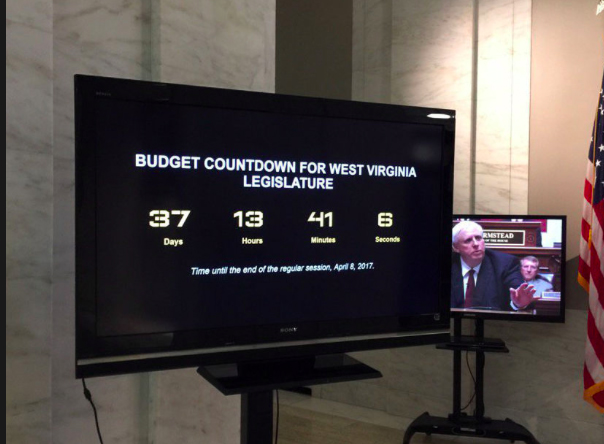By RUSTY MARKS
The State Journal
CHARLESTON, W.Va. — They say time heals all wounds. But, in the annals of West Virginia politics, it’s just as likely to rub salt into them.
That may be why Democratic Gov. Jim Justice and the West Virginia Republican Party recently unveiled competing electronic countdown clocks critical of the other side.

(Photo by Rusty Marks)
On March 1, Justice debuted a “budget time clock” on the governor’s website and on a large, flat-screen television monitor on display just outside the governor’s reception room in the State Capitol building. The clock dutifully counts down the minutes and seconds until the end of the 83rd legislative session, which is at midnight on April 8. Justice spokesman Grant Herring said the clock is intended to remind members of the state Senate and House of Delegates they need to come up with a budget before the end of the legislative session.
Last year, a delay in the members of the House and Senate to agree on a budget led to an extended special session that ended up costing close to $600,000.
The state is facing a projected budget deficit of $450 million, or possibly more, for the upcoming fiscal year. Justice and some Democratic members of the House and Senate have been pushing Republican leadership in both chambers for information about when a budget bill may be presented.

“The clock is ticking, the session is almost halfway finished and the Legislature still hasn’t come up with a budget — I’ve already released two plans that put West Virginia on a pathway to prosperity,” Justice said in a prepared statement. “This budget crisis won’t be solved by wasting time.”
“I want the people of West Virginia to realize that the Legislature is on the clock and needs to get moving,” he added. “The last thing we need is a long special session that wastes $35,000 a day.”
Senate Minority Leader Roman Prezioso, D-Marion, spent several sessions as Senate Finance Committee chairman when his party was in power. He said those walking past the governor’s office should see the budget clock every day.
“I think it makes us cognizant of the amount of time we’ve got left in the session,” Prezioso said. “Sometimes, you just need a little reminder. I kind of like it.”
But other lawmakers aren’t so enamored of the big black time clock.
“I think it’s a political tool,” said state Senate President Mitch Carmichael, R-Jackson. “It’s ridiculous.”
Carmichael said senate finance committee members have been working on a budget document since early in the legislative session.
“I guarantee we’re going to present a budget in record time,” Carmichael said. “A responsible budget.”
Those who have been in the Legislature for several years say the budget always takes a long time to complete.
Delegate Eric Householder, R-Berkeley and vice chairman of the House Finance Committee, said the budget process usually takes the entire 60-day regular session to complete. He said legislation passed during the session can affect the overall budget, so lawmakers have to wait.
“We’ll probably get it out a week early,” he said. “Maybe two weeks early.”
Carmichael has said he intends to present a budget before the 50th day of the legislative session. Known as crossover day, it is the last day legislation can be presented in one chamber in time to be considered by the other.
Meanwhile, members of the state Republican Party have fired back at Justice with an electronic clock of their own.
A link on the state party’s website, wvgop.org, counts off “Days Since Jim Justice Became Governor & Hasn’t Paid His Taxes.” On March 2, the clock sat at 113 days and counting.
Justice owns several coal businesses in West Virginia and other states. According to news reports, his West Virginia businesses still owe the state of West Virginia about $4.4 million in unpaid severance taxes.
On March 2, the West Virginia Ethics Commission approved an agreement to let Justice transfer a portion of his business holdings into a blind trust. Justice’s attorney said the governor intends to transfer more holdings as financial arrangements can be worked out.
Justice had previously transferred control of his coal and agricultural businesses to his son, Jay. His daughter, Jill, had been named president of The Greenbrier in September.
Officials for the state Department of Revenue have not discussed, so far, what recourse the state may have if the governor or another public official fails to pay severance taxes for businesses they own.
See more from The State Journal






